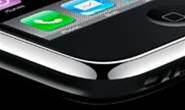
The software must be installed by the user, and exists largely as proof that Linux can be ported to the handset. The researchers noted that several major features, such as sound support, touch-screen capability and wireless networking, had yet to be figured out.
The software supports a serial-to-USB connection and can be installed by the user. However, the developers have warned novice users and those unfamiliar with the inner workings of the iPhone's installation and recovery process against attempting to install the code.
The developers also said that the installation is capable of causing permanent damage to the iPhone if certain components are not correctly backed up.
News of the achievement is the latest milestone from an underground development community that has been working to hack the iPhone since it was introduced in 2007.
Groups such as the 'iPhone Dev Team' have long sought to lift many of Apple's locks on the hardware and allow the installation of applications which are not necessarily authorised by the company.
Although some developers are members of both projects, those behind the iPhone Linux project note that it is a separate endeavour from the iPhone Dev Team's ongoing work in unlocking the iPhone.
Apple has so far turned a blind eye to the practice of hacking the device, which voids the warranty. The company said that, while it will not deliberately target hacked handsets, software updates to the iPhone will often remove software or render the phones inoperable.



_(33).jpg&h=140&w=231&c=1&s=0)
_(28).jpg&h=140&w=231&c=1&s=0)





 iTnews Executive Retreat - Security Leaders Edition
iTnews Executive Retreat - Security Leaders Edition
 iTnews Benchmark Awards 2026
iTnews Benchmark Awards 2026
 iTnews Cloud Covered Breakfast Summit
iTnews Cloud Covered Breakfast Summit
 The 2026 iAwards
The 2026 iAwards












_(1).jpg&h=140&w=231&c=1&s=0)



